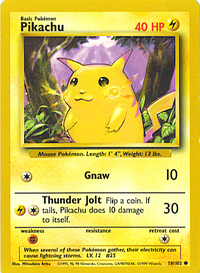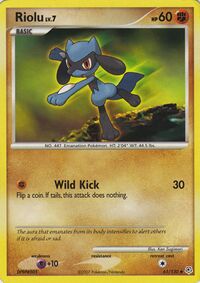Pikachu (Base Set 58): Difference between revisions
(Red/yellow print run is assumed to be a 50/50 split in 1st Edition and Shadowless. Previous text made it sound like red cheeks had a smaller distribution.) |
(+GB) |
||
| Line 90: | Line 90: | ||
This card was later reprinted in the {{TCG|POP Series 2}} with new artwork by [[Yuka Morii]], first released as one of the Japanese {{TCG|PCG-P Promotional cards}}, made available as part of a Meiji Chocolate campaign in June 2005. A {{TCG|retro card|special reprint}} was included in the {{TCG|Rising Rivals}} expansion with redrawn art by Mitsuhiro Arita, first released in the Japanese {{TCG|Bonds to the End of Time}} expansion. | This card was later reprinted in the {{TCG|POP Series 2}} with new artwork by [[Yuka Morii]], first released as one of the Japanese {{TCG|PCG-P Promotional cards}}, made available as part of a Meiji Chocolate campaign in June 2005. A {{TCG|retro card|special reprint}} was included in the {{TCG|Rising Rivals}} expansion with redrawn art by Mitsuhiro Arita, first released in the Japanese {{TCG|Bonds to the End of Time}} expansion. | ||
==Gallery== | |||
{{TCGGallery | {{TCGGallery | ||
|type=Lightning | |type=Lightning | ||
| Line 106: | Line 106: | ||
|set5=Rising Rivals | |set5=Rising Rivals | ||
|illus5=Mitsuhiro Arita | |illus5=Mitsuhiro Arita | ||
}} | |||
===In the video games=== | |||
{{TCGGallery | |||
|type=Lightning | |||
|image1=TCG1 A19 Pikachu.png | |||
|size1=64px | |||
|caption1={{ga|Pokémon Trading Card Game|GB1}} | |||
|image2=TCG2 A28 Pikachu.png | |||
|size2=64px | |||
|caption2=[[Pokémon Card GB2: Here Comes Team GR!|GB2]] | |||
}} | }} | ||
Revision as of 10:58, 3 September 2020
| ||||||||||||||||||||||||||||||||||||||||||||||||||||||||||||||||||||||||||||||||||||||||||||||
| ||||||||||||||||||||||||||||||||||||||||||||||||||||||||||||||||||||||||||||||||||||||||||||||
| ||||||||||||||||||||||||||||||||||||||||||||||||||||||||||||||||||||||||||||||||||||||||||||||
Pikachu (Japanese: ピカチュウ Pikachu) is a Lightning-type Basic Pokémon card. It was first released as part of the Base Set.
Card text
| |||
| |||
| |||
Pokédex data (Base Set and Base Set 2 prints)
| Pikachu - Mouse Pokémon | ||
|---|---|---|
| No. | Height | Weight |
| 025 | 1'4" (0.4 m) | 13 lbs. (6 kg) |
| Pokédex entry | ||
| When several of these Pokémon gather, their electricity can cause lightning storms. | ||
| ほっぺたの両側に小さい電気袋をもつ。ピンチのときに放電する。 | ||
Pokédex data (Rising Rivals print)
| Pikachu - Mouse Pokémon | ||
|---|---|---|
| No. | Height | Weight |
| 025 | 1'04" (0.4 m) | 13.2 lbs. (6 kg) |
| Pokédex entry | ||
| It has small electric sacs on both cheeks. If threatened, it looses electric charges from the sacs. | ||
| ほっぺたの りょうがわに ちいさい でんきぶくろを もつ。 ピンチのときに ほうでんする。 | ||
Release information
This card was included in the Base Set with artwork by Mitsuhiro Arita, first released in the Japanese Expansion Pack. It has two versions: a red-cheeked variant and the true yellow-cheeked version. The split between red cheeks and yellow cheeks is roughly 50% in 1st Edition and Shadowless print runs, however the Unlimited print run only features the yellow cheeks version making the red cheeks version more sought after. Both versions also have promotional variants with a gold foil "E3" stamp where the set symbol would appear in later sets. The yellow-cheeked version was available as an insert in the September 1999 issue of Nintendo Power, while the red-cheeked variant was distributed to those who visited the Nintendo booth at the Electronic Entertainment Expo (E3) between May 13-15, 1999. Similarly to the non-promotional versions, the red-cheeked variant is considerably more valuable. In Japan, this card was reprinted with artwork by Mina Akuhara, one of five winning entries of the CoroCoro Pokémon Snap Best Photo Contest held in Spring 1999. This print has a camera graphic where an expansion symbol normally would be and text on the bottom right reads: Best Photo Contest Winners Prize Card. This version is extremely rare and the exact number in existence is unknown. The Base Set yellow-cheeked version was released again as a promotional card in Japan, but in English on Japanese card stock as part of the Pokémon Song Best Collection CD. The yellow-cheeked version of the Base Set print also has another promotional variant with a gold foil "PokéTour 1999" stamp in the top right corner of the illustration. This card was included in 'Tour packs' distributed at locations visited by the PokéTour in Australia in 1999, which were advertised to be limited to 3000 at each venue. The PokéTour consisted of two separate tours: Red, which ran on weekends from September 18 to October 9, 1999; and Blue, which ran on weekends from September 18 to October 7, 1999. A Jumbo version of the Base Set print was included with the February 2000 issue of Top Deck Magazine. The yellow-cheeked version of the Base Set print was reprinted in the Bulbasaur Deck of the Japanese Intro Pack, in the Base Set 2 expansion, and in the Totodile Half Deck of the Japanese Intro Pack Neo.
This card was later reprinted in the POP Series 2 with new artwork by Yuka Morii, first released as one of the Japanese PCG-P Promotional cards, made available as part of a Meiji Chocolate campaign in June 2005. A special reprint was included in the Rising Rivals expansion with redrawn art by Mitsuhiro Arita, first released in the Japanese Bonds to the End of Time expansion.
Gallery
|
|
| ||||||
|
|
In the video games
|
|
Trivia
- This card is popularly known as Yellow Cheeks Pikachu as a reference to the card's artwork and to differ it from Pikachu card from the Jungle expansion. This name also appeared in some instruction manuals produced by Wizards of the Coast.
- The original Japanese version depicts Pikachu with yellow cheeks. However, Wizards of the Coast, when releasing this card for the first time in English, deliberately recolored Pikachu's cheeks red in an effort to make it more recognizable. Wizards would however later reverse this decision in subsequent reprints of the card and return Pikachu's cheeks to their original yellow color; because of this reversal the original red cheeks is commonly mistaken to be an error. The later reprint in Rising Rivals depicts Pikachu with red cheeks, because it is not giving off electric sparks.
- Although not part of a numbered promotional set, the Pikachu distributed at E3 in 1999 is the first English promotional card.
Origin
Thunder Jolt is a move in the Super Smash Bros. series that Pikachu can use. This card's English Pokédex entry comes from Pokémon Red and Blue, though it is slightly reworded. The Japanese entry comes from Pokémon Red and Green. The Rising Rivals Pokédex entry comes from Pokémon FireRed.

|
This article is part of Project TCG, a Bulbapedia project that aims to report on every aspect of the Pokémon Trading Card Game. |
- Cards
- Pokémon cards
- Pikachu (TCG)
- Pokémon cards with 40 HP
- Pokémon cards with a Retreat Cost of 1
- Basic Pokémon cards
- Lightning-type Pokémon cards
- Cards with Gnaw
- Pokémon cards with attack damage 10
- Cards with Thunder Jolt
- Pokémon cards with attack damage 30
- Base Set cards
- Expansion Pack cards
- Promotional cards
- Intro Pack cards
- Base Set 2 cards
- Intro Pack Neo cards
- POP Series 2 cards
- PCG-P Promotional cards
- Rising Rivals cards
- Bonds to the End of Time cards
- Illus. by Mitsuhiro Arita
- Photo. by Mina Akuhara
- Illus. by Yuka Morii
- Holographic cards
- Jumbo cards
- Secret cards






